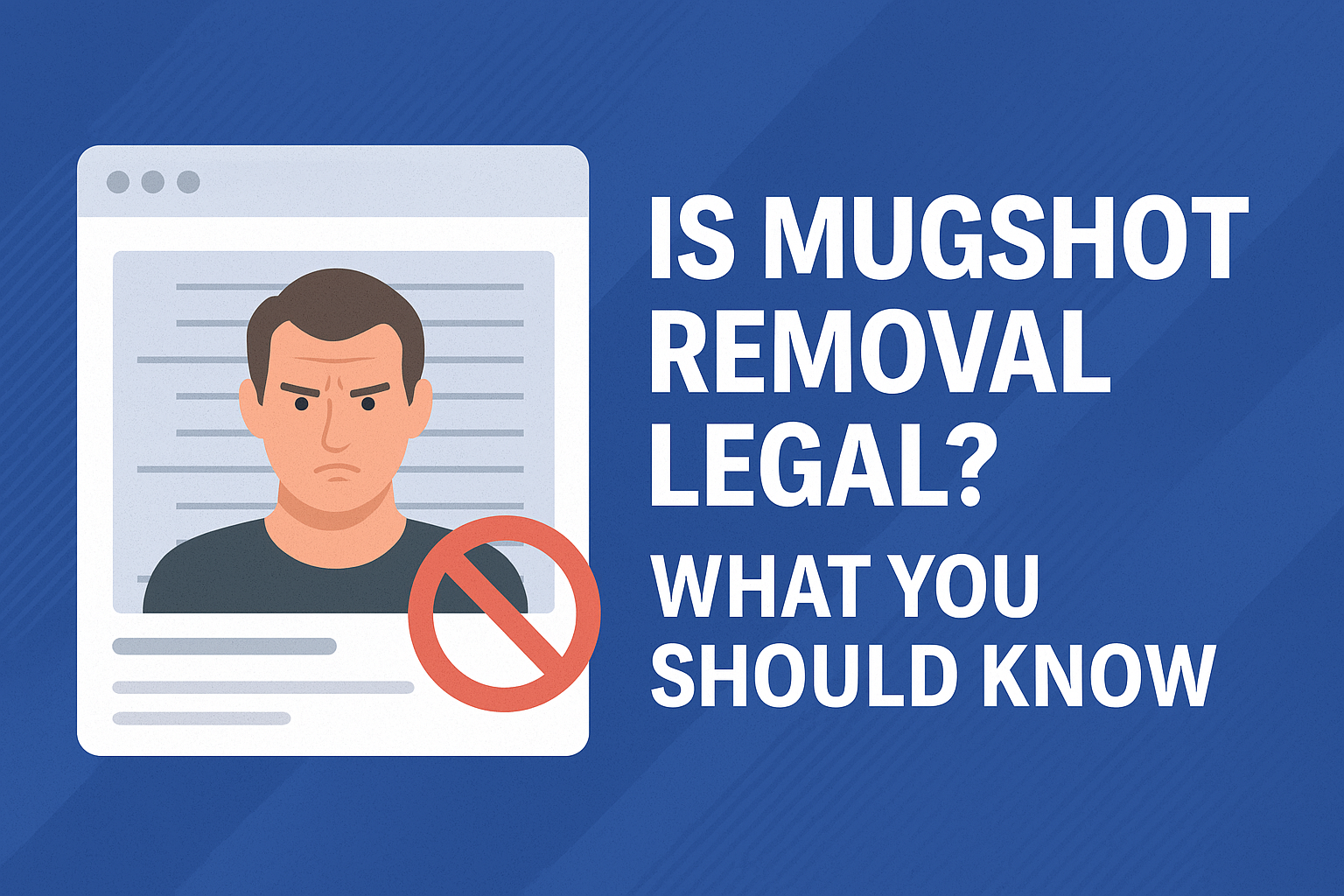Estimated reading time: 4 minutes
Table Of Content
What Is a Mugshot and Why Is It Public?
A mugshot is a booking photograph taken by law enforcement following an arrest. In most U.S. states, mugshots are classified as public records. That means they are accessible through police departments, sheriff’s offices, and court websites unless sealed or expunged.
Unfortunately, once mugshots are released publicly, they can be scraped by third-party websites—including mugshot aggregators—and displayed prominently on search engines.
Why Mugshot Removal Matters
Mugshots can:
- Damage your personal and professional reputation
- Jeopardize job opportunities
- Harm personal relationships
- Stay online even if charges were dropped or expunged
For these reasons, many people seek mugshot removal services. But is that process legal?
Is It Legal to Remove Mugshots from the Internet?
Yes—if done through lawful means.
Removing mugshots becomes illegal only when:
- You hack or unlawfully access a website’s backend
- You violate terms of service or impersonate someone
- You bribe or threaten webmasters
Legitimate mugshot removal is legal and often involves:
- Sending takedown requests
- Filing court orders or expungement documentation
- Leveraging Right to Be Forgotten claims (in applicable jurisdictions)
- Negotiating with website administrators
- Suppressing results through SEO and content publishing
Legal Grounds for Mugshot Removal
1. Expungement or Sealed Records
If your record was expunged or sealed, you may be entitled to demand removal. In many states, it is unlawful for third-party sites to display expunged arrest records.
2. Defamation or False Information
If a mugshot site includes false or misleading context (e.g., wrong charges, claims of conviction when you weren’t), you may have a case under defamation laws.
3. Right of Publicity or Privacy Invasion
In some states, the use of your image for profit—such as charging fees to remove mugshots—can trigger Right of Publicity or privacy claims.
States with Mugshot Removal Laws
Several states have passed laws making it illegal to profit from mugshots. Here are a few notable examples:
| State | Mugshot Law Highlights |
|---|---|
| California | SB 1027 prohibits charging removal fees for booking photos |
| Georgia | Law requires mugshot site owners to remove images within 30 days of a written request |
| Texas | Prohibits using criminal records for economic gain without written consent |
| Oregon | Mandates mugshot takedown upon request if charges were dismissed or acquitted |
| Utah | Makes it illegal to publish and charge for mugshot removals unless the case resulted in a conviction |
Refer to your state’s statutes or consult with a licensed attorney for more information.
How Search Engines Handle Mugshot Requests
Google’s Stance on Mugshots
Google has a exploitive content removal policy that allows users to request removal of mugshots from search results if they appear on sites primarily designed to exploit individuals.
Requirements for removal include:
- Proof of identity
- Evidence that the site charges for takedown
- Confirmation that the content violates Google’s policies
Other search engines like Bing and Yahoo follow similar protocols but are generally less responsive.
Can You Sue Mugshot Websites?
Yes, under the right conditions. Lawsuits have been filed for:
- Defamation (when information is false or misleading)
- Right of Publicity violations
- Emotional distress
- Violations of state-specific mugshot laws
However, legal battles can be long, costly, and complex—especially when sites are hosted overseas.
Legal Alternatives to Suing
If you can’t afford a lawsuit or prefer a faster solution, consider these options:
1. Contact Website Administrators
Politely request removal by citing:
- Expungement orders
- Updated court records
- State mugshot laws
2. Submit Takedown Requests
File formal requests through:
- Google’s removal tool
- Bing’s content removal tool
- Hosting providers and domain registrars
3. Use Reputation Management Services
Online reputation companies like Defamation Defenders specialize in:
- Contacting site owners directly
- SEO-based suppression of mugshots
- Submitting legal takedown notices
📩 Need help fast? Contact Defamation Defenders to remove mugshots and reclaim your reputation.
What If the Website Is Overseas?
This is where it gets tricky. Many mugshot sites are based abroad to dodge U.S. jurisdiction. Options include:
- Filing DMCA notices (if the content violates copyright)
- Working with local attorneys to pursue international action
- Using SEO suppression strategies
Cost of Mugshot Removal Services
Removal services can range from $500 to $5,000+, depending on the:
- Number of websites
- Complexity of removal
- Whether court orders are involved
- Hosting location of the content
Be wary of guaranteed results or companies promising “instant deletion.” Always verify credentials and terms before signing an agreement.
Steps to Legally Remove Your Mugshot
markdownCopyEdit1. Confirm your mugshot’s presence via Google or mugshot databases
2. Obtain relevant court documents (dismissal, expungement, etc.)
3. Search for your state’s mugshot laws
4. Contact the webmaster with a removal request
5. File removal requests with search engines
6. Consult a reputation management agency like Defamation Defenders
7. If needed, escalate with legal counsel
Frequently Asked Questions
No, unless the state law prohibits monetizing or misusing them for profit.
Yes, especially in states with removal laws tied to non-convictions or dismissals.
In certain states—yes. But many sites are hosted overseas, making enforcement harder.
Yes, if it meets Google’s criteria. Alternatively, use SEO suppression or legal notices.
Using a mugshot removal service like Defamation Defenders offers the most effective results, especially when multiple sites are involved.
Related Content You Might Like:



